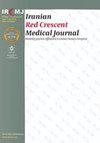Melatonin for Clinical Improvement in Patients with Ischemic Stroke: A Randomized Clinical Trial
IF 0.2
4区 医学
Q3 MEDICINE, GENERAL & INTERNAL
引用次数: 0
Abstract
Background: Ischemic stroke is the most frequent form of stroke, which imposes considerable cost and causes disabilities for the patients. Melatonin is proven to have anti-oxidant along with anti-inflammatory effects. Objectives: The present study aimed to examine the effects of melatonin on clinical features of acute stroke in Iranian patients. Methods: This randomized clinical trial was conducted on 58 patients who were admitted to Valiasr Hospital and Neurology Center in Arak, Iran, from April 2016 to April 2017. Inclusion criteria were: age ≥ 50 years and diagnosis of acute ischemic stroke. All participants were asked to fill out informed consent forms before entering the study. Through simple randomization, an expert nurse divided cases into two groups of 29 people: Group 1 as the intervention group: ASA 80mg/day + Plavix 75 mg/day + melatonin 3 mg (every night one pill for two months), Group 2 as the control group: ASA 80 mg/day + Plavix 75 mg/day + placebo (every night one pill for two months). Canadian Neurological Stroke Scale (CNSS) was recorded for all cases before and after treatment. Results: Mean age, sex, circulation, cardiovascular accident incidence time, and symptoms were not significantly different between the two groups. Mean of the CNSS was significantly higher after the treatment in both groups. It improved significantly more in the intervention group than in the control group. Conclusion: Findings of the present study showed that CNSS improved more in the intervention group than in the control group. Therefore, melatonin administration in patients with ischemic stroke will result in better clinical improvements.褪黑素对缺血性脑卒中患者的临床改善:一项随机临床试验
背景:缺血性脑卒中是最常见的脑卒中形式,它给患者造成了相当大的成本和残疾。褪黑素已被证明具有抗氧化和抗炎作用。目的:本研究旨在探讨褪黑素对伊朗急性脑卒中患者临床特征的影响。方法:对2016年4月至2017年4月在伊朗阿拉克Valiasr医院和神经病学中心住院的58例患者进行随机临床试验。纳入标准为:年龄≥50岁,诊断为急性缺血性脑卒中。所有参与者在进入研究前都被要求填写知情同意书。专家护士通过简单随机化将病例分为两组,每组29人,第一组为干预组:ASA 80mg/天+ Plavix 75mg /天+褪黑素3mg(每晚一片,持续两个月),第二组为对照组:ASA 80mg/天+ Plavix 75mg /天+安慰剂(每晚一片,持续两个月)。记录所有病例治疗前后的加拿大神经卒中量表(CNSS)。结果:两组患者的平均年龄、性别、血液循环、心血管意外发生时间、症状无显著差异。两组治疗后CNSS平均值均显著升高。干预组的改善明显大于对照组。结论:本研究结果表明,干预组的CNSS改善程度高于对照组。因此,缺血性脑卒中患者给予褪黑素治疗会有更好的临床改善。
本文章由计算机程序翻译,如有差异,请以英文原文为准。
求助全文
约1分钟内获得全文
求助全文
来源期刊

Iranian Red Crescent Medical Journal
MEDICINE, GENERAL & INTERNAL-
CiteScore
1.16
自引率
0.00%
发文量
0
期刊介绍:
The IRANIAN RED CRESCENT MEDICAL JOURNAL is an international, English language, peer-reviewed journal dealing with general Medicine and Surgery, Disaster Medicine and Health Policy. It is an official Journal of the Iranian Hospital Dubai and is published monthly. The Iranian Red Crescent Medical Journal aims at publishing the high quality materials, both clinical and scientific, on all aspects of Medicine and Surgery
 求助内容:
求助内容: 应助结果提醒方式:
应助结果提醒方式:


